It's not often that avoiding something makes you more likely to become intolerant of it, but new research suggests that high doses of sweetener increases your risk of developing an intolerance to glucose - the most important simple sugar in human metabolism.
If scientists from the Weizman Institute of Science in Israel confirm this link, it will join the handful of other potential negative side effects of artificial sweetener, including an increase in appetite, and an increased risk of bladder cancer and vascular disease.
Last year, the Weizman Institute team discovered that sweeteners are messing with our gut bacteria in a way that could lead to weight gain and diabetes. Continuing their research, they've now found that because most sweeteners pass through the gastrointestinal tract without being digested, they're directly impacting the composition of helpful bacterial colonies that live in our gut. These colonies are responsible for maintaining a number of crucial biological processes, including how the body metabolises sugar.
To discover this, the scientists put a bunch of healthy lab mice though a glucose intolerance test. Once this baseline was set, says Sonja Schmitzer at DocCheck News, the team split the mice into three groups and added the maximum recommended daily consumption dose of one of three types of artificial sweetener - saccharin, aspartame or Sucralose - to the drinking water of one. The other groups acted as controls, and had their water sweetened with regular sugar, or none at all.
Left to their own devices for 11 weeks, the mice were then subjected to a follow-up glucose intolerance test, and the results were surprisingly clear - the sweetener group had developed an intolerance to glucose, while the other two groups had not. Glucose intolerance is a strong precursor to the development of type 2 diabetes. "Further experiments with obese mice and animals of varied strains showed the same result: the consumption of sweeteners always led to glucose intolerance, a misregulated glucose metabolism," says Schmitzer.
To confirm if gut bacteria actually have an effect on glucose intolerance, the Weizman Institute team gave two groups of lab mice - healthy and obese - antibiotics to kill off their gastrointestinal flora, and put them on an artificially sweetened-water diet. Without colonies of gut bacteria present, the team found that after four weeks, there was no difference in the glucose intolerance test between the lean and obese mice, and those drinking sweetener in their water, and the control group.
"These results suggest that the sweetener-induced glucose intolerance is caused by changes in the gut flora and the different proportions of its bacterial representatives", the team reports in the journal Nature.
To investigate further, the researchers transferred gut microbe colonies from sweetener mice to control microbe-free mice that had been drinking unsweetened or sugar-sweetened water, and found that they quickly developed glucose intolerance. When they looked at the colonies under the microscope, they found that levels of different species were all messed up, with populations of some important healthy bacteria having fallen significantly in the mice that had been consuming sweetener. "In the sweetener-fed mice the researchers were also able to detect a multitude of active metabolic pathways which are responsible for increased energy intake from food and thus promote the development of obesity," says Schmitzer at DocCheck News.
Which is all very concerning for mice, but how does this apply to humans? The team also investigated the link between sweeteners and glucose intolerance in 381 people, 40 of which reported that they were regular consumers of artificial sweetener. According to Schmizter, the team reportedly found "a significant positive correlation between the sweetener consumption and several clinical parameters associated with this metabolic syndrome".
To take this further, the team worked with seven regular sweetener consumers and gave them the maximum daily amount of sweetener recommended by the American FDA, split into three doses to be taken throughout the day.
Sonja Schmitzer explains the results at DocCheck News:
"Already after four days, the initially normal glucose tolerance had significantly deteriorated in four participants. And similarly to that in the mice, the composition of their gut microflora had also changed. In three subjects, both glucose tolerance and the composition of the gut microbiomes remained unchanged.
When the researchers transferred stool samples of the subjects to gastrointestinally bacteria-free mice, only those which had received the stool from among the four subjects who had reacted to the consumption of saccharin then developed glucose intolerance."
So it looks like, depending on the unique composition of your gut bacteria, you may or may not react negatively to large amounts of artificial sweetener.
"Sweeteners are supposed to protect humanity from obesity and high blood glucose levels. Along with other changes in the human diet, the number of diabetics and obese people has increased concurrently with the mass consumption of sweeteners," the team writes.
More work needs to be done to figure out what types of gut bacteria colonies react more negatively to artificial sweeteners, and also how moderate levels of sweetener consumption affect them.
Source: DocCheck News
